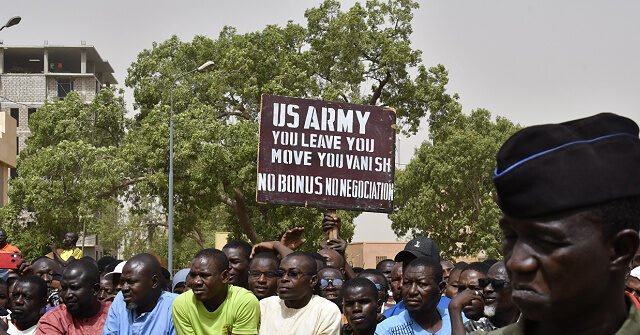The United States on Monday formally handed its last military base in Niger over to the ruling military junta, completing a pullout ordered by Niger’s rulers in March.
About two dozen American troops remain in the country to handle administrative tasks, but they have been instructed to leave by September 15.
Niger became the latest global retreat for President Joe Biden when the military officers who control the country decided in March not to renew a strategically vital counterterrorism operation that was launched in 2012. Niger provided crucial bases for operations in the terrorist-infested Sahel region, where groups linked to both al-Qaeda and the Islamic State operate.
The U.S. deployment had already been substantially reduced when the elected government of Niger was overthrown by a junta calling itself the National Council for Safeguarding the Homeland (using the French acronym CNSP) in July 2023.
The CNSP claimed U.S. forces “did nothing while the terrorists killed people and burned towns,” as junta-installed Prime Minister Ali Mahaman Lamine Zeine put it. Zeine said Biden administration officials sent to negotiate with his government were arrogant, condescending, and threatening, particularly in their insistence that Niger should scuttle a rumored sale of uranium to Iran.
Biden officials essentially agreed with Zeine’s account of their deteriorating relationship, except they insisted he was given a “choice, not an ultimatum” about keeping good relations with the U.S. and respecting its “democratic values and national security interests.”
The Biden team insisted its difficulties with Niger could be worked out until May, when the Pentagon destroyed that narrative by ordering the 1,000 American combat troops in Niger to prepare for withdrawal.
Critics worried that Biden was leaving U.S. troops “sitting on a powder keg,” as Rep. Matt Gaetz (R-FL) put it. Gaetz compared the situation to the tense build-up to the Obama administration’s disaster in Benghazi in 2012.
Secretary of Defense Lloyd Austin confirmed in May that Russian troops were moving into Niger’s Airbase 101, located near the capital of Niamey, even though some American soldiers were still quartered there. Senior defense officials gritted their teeth and hoped there would be no confrontations.
Biden officials kept talking about a limited “drawdown to a level that Nigeriens can live with,” but that level turned out to be zero.
U.S. forces withdrew completely from Airbase 101 this month, and on Monday, the Department of Defense (DoD) and its Nigerien counterpart announced the handover of Airbase 201, the larger of the two American bases.
“The withdrawal of U.S. forces and assets from Air Base 201 in Agadez is complete. The effective cooperation and communication between the U.S. and Nigerien armed forces ensured that this turnover was finished ahead of schedule and without complications,” the U.S. Africa Command (AFRICOM) said in a statement on Monday.
Airbase 101 was primarily used for launching unmanned aerial vehicles (UAVs) such as the MQ-9 Reaper drone, while Airbase 201, opened in 2019, was capable of handling massive C-17 Globemaster transport planes.
Biden officials have been vague about how much American equipment was left behind at both bases. The U.S. and its European allies invested hundreds of millions of dollars in the Niger operation, including training for Nigerien forces. The Airbase 201 construction project cost U.S. taxpayers at least $100 million.
Pentagon officials have said weapons and other “sensitive equipment” were prioritized for swift removal from the bases. Expensive gear like the massive million-dollar generators provided for Airbase 201 is reportedly being shipped to Europe for the time being. Senior U.S. officials said the Niger junta has promised not to hand any remaining U.S. equipment or structures over to the Russians, who have been moving into the region with a newly-formed “Africa Corps.”
U.S. and U.N. reports say terrorist activity is increasing in the Sahel as forces from the U.S. and former colonial power France withdraw.
The U.N. released a report last week saying the “most significant threat” in the region is Jamaa Nusrat ul-Isla wa al-Muslimin (JNIM), a group linked to al-Qaeda. According to the report, JNIM has five to six thousand fighters in the region, and may soon be capable of establishing “an emirate from central Mali to northern Benin.”
The report found ISIS and its West African franchise, known as ISWAP, is also growing in strength and could actually have more fighters than JNIM, although its focus is divided to other regions.
JNIM and ISIS have apparently forged a truce while they concentrate on expanding their spheres of influence, taking advantage of the U.S. and European pullouts. Most international analysts believe it is only a matter of time before Niger falls to jihadists, especially since the Russians brought in as mercenaries by nervous juntas like those in Niger and Mali have proven ineffective against insurgent forces.
